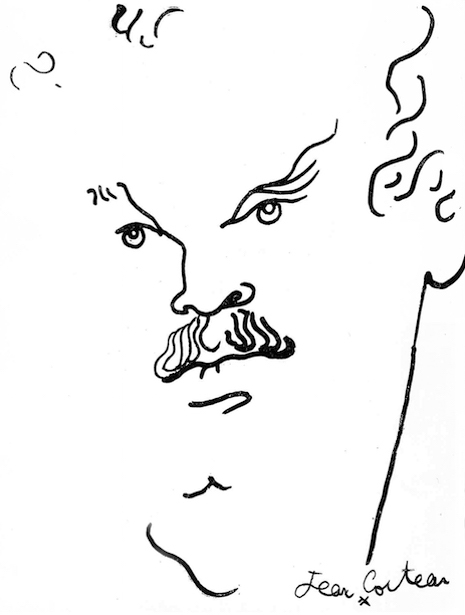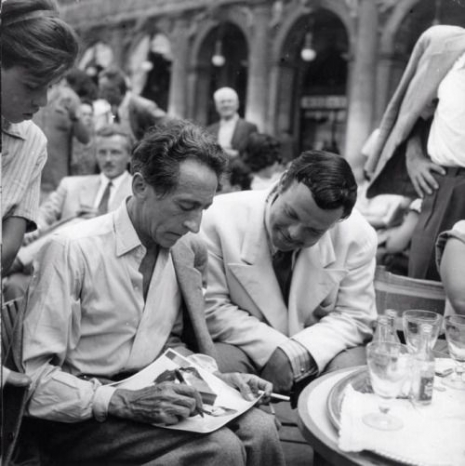
Orson Welles by Jean Cocteau (from the frontispiece of André Bazin’s book on Welles)
Orson Welles and Jean Cocteau first met at a performance of “Voodoo Macbeth,” the all-black Shakespeare production Welles staged in New York in 1936 with funding from a New Deal program. They remained friends and encouraged one another’s rascality, according to Simon Callow’s account of the 1948 Venice Film Festival in One-Man Band, the third volume of his Welles biography:
He and the perenially provocative Jean Cocteau formed a sort of anti-festival clique, clubbing together to commit what Cocteau rather wonderfully called lèse-festival. [...] Together in Venice, the two men behaved like two very naughty boys. Welles shocked his hosts by ostentatiously walking out of the showing of Visconti’s uncompromisingly severe masterpiece, La Terra Trema.

Cocteau and Welles in Venice, 1948
Welles was a member of the Comité d’Honneur at Cocteau’s 1949 Festival du Film Maudit, at which both The Magnificent Ambersons and The Lady from Shanghai were screened. (Kenneth Anger’s Fireworks made its European debut there, too, and Artaud’s “Sorcery and Cinema” was first published in the festival catalog.) Cocteau contributed this sketch of his friend to the program for Welles’ The Blessed and the Damned, an evening of two one-act plays that opened in Paris in 1950:
Orson Welles is a giant with the face of a child, a tree filled with birds and shadows, a dog who has broken loose and gone to sleep in the flower bed. An active loafer, a wise madman, a solitary surrounded by humanity, a student who sleeps during the lesson. A strategy: pretending to be drunk to be simply left alone. Seemingly better than anyone else, he can use a nonchalant attitude of real strength, apparently drifting but guided by a half-opened eye. This attitude of an abandoned hulk, and that of a sleepy bear, protects him from the cold fever of the motion picture world. An attitude which made him move on, made him leave Hollywood, and carried him to other lands and other horizons.
Quoting some of the increasingly hysterical praise for Welles printed elsewhere in the program and then in the show’s reviews, Callow wonders: “At least Cocteau had the excuse of being an opium addict; what were these chaps on?” But the tone of Cocteau’s 1962 poem for Welles, reprinted in Maurice Bessy’s Orson Welles, is sober by comparison:
Orson Welles is a poet
through his violence
and through his grace.
Never does he tumble
from the tightrope
on which he crosses cities
and their dramas.He is a poet too in the
loyal friendship he bears
our dreams and our struggles.Others will know better than I
how to praise his work.
I content myself with sending him
my fraternal greeting.His handshake is as firm as he is
and I think of it each time my work
obliges me to leap over an obstacle.
Below, Cocteau makes a brief appearance in the Paris episode of Around the World with Orson Welles, right at the 19-minute mark.